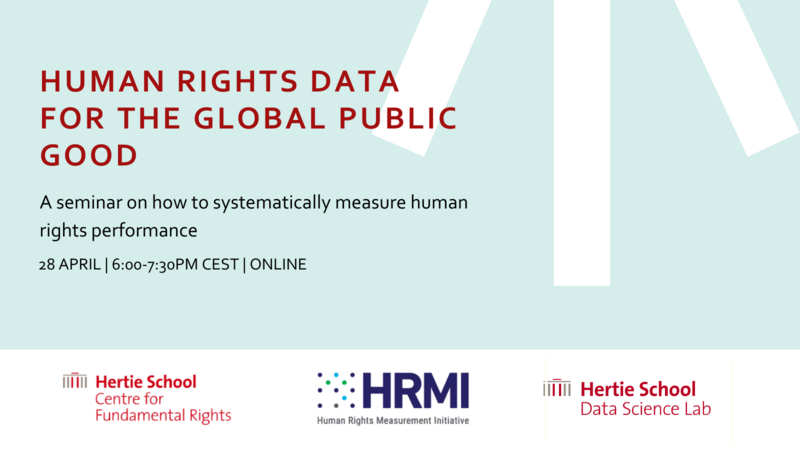
In this online seminar, members of the Human Rights Measurement Initiative (HRMI) team will introduce how and why they measure human rights. This event is hosted by the Centre for Fundamental Rights and the Hertie School Data Science Lab, in collaboration with the Human Rights Measurement Initiative.
“What gets measured gets improved” is guiding the work of the Human Rights Measurement Initiative (HRMI), the first global project to independently and comprehensively measure the human rights performance of countries as different as Samoa and India, New Zeeland and China, or Jordan and the USA. HRMI uses two distinct methodologies to provide country-level scores for five economic and social rights, and eight civil and political rights. All the scores and data are freely available to anyone at RightsTracker.org.
In this online seminar, members of the HRMI team will introduce how and why they measure human rights, discuss how policymakers are already using HRMI data for good, and discuss some ways HRMI is working to expand country and rights coverage in the future.
The event is open for students and practitioners interested in human rights, in policy-relevant data science, and in the intersection of data science and human rights activism. The first 60 minutes will be focused on HRMI’s ongoing work (including a Q&A), the last 30 minutes will be a discussion with seminar participants on how HRMI’s work could be expanded, how data science could make use of the HRMI data, and how human rights data could better reach national and global policy-makers or activists.
Prior registration is required. Registered attendees will receive the dial-in details via e-mail prior to the event.
Speakers
Mennah Abdelwahab is a senior at the University of Georgia studying international affairs and journalism. She has been involved with the Human Rights Measurement Initiative since January 2021 and has been conducting human rights research since her freshman year.
Stephen Bagwell (Economic and Social Rights Team) is an assistant professor of political science at the University of Missouri—St. Louis. His teaching and research are focused on the intersections of data, political violence, and economics.
Meridith LaVelle (Civil and Political Rights Team) is a Ph.D Candidate at the University of Georgia's School of Political and International Affairs. Her research agenda centers on the intersections of human rights, dissent/repression, democratization, and technology/media.
Asia Parker (Civil and Political Rights Team) is both a contributing member to HRMI's Civil and Political Rights team, and a Ph.D Student at the University of Georgia. Her research focuses on how underrepresented groups– particularly women, strive for equality and the ways foreign assistance can support their endeavors.
Matthew Aaron Rains (Civil and Political Rights Lead) is dedicated to using research for advancing and improving human rights conditions globally, through the creation of data and empowerment of human rights advocates. His research agenda focuses on discrimination and oppression against marginalized people, political violence/civil conflict, and tackling difficult measurement problems in political science.
Annie Watson (Children’s Rights Co-lead and Economic and Social Rights Team) is an Assistant Professor of Political Science at Middle Georgia State University and a Research Fellow for Women's and Children's Rights at the Human Rights Measurement Initiative (HRMI). She is passionate about using data to hold governments accountable for human rights standards and has eight years of experience on human rights measurement projects.
Chair:
Ronny Patz is an Adjunct Professor and Senior Lecturer at Hertie School teaching Global Politics and the Global Governance of Human Rights. Ronny's research is focused on the administration and financing of the United Nations system and on the use of natural language processing (NLP) for studying diplomatic text and speech.

